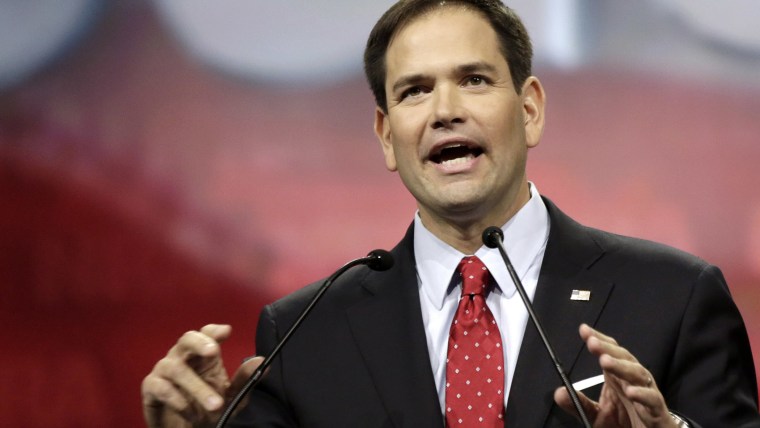Last week, during a memorable Senate Foreign Relations Committee hearing, Sen. Marco Rubio (R-Fla.) tried to press Secretary of State John Kerry on a variety of key challenges abroad.
It didn't go well -- Rubio stumbled badly on several key details, and Kerry made him look pretty foolish.
Soon after, Rhonda Swan, a Florida-based journalist, wrote that the Republican senator "
should be embarrassed." Swan added, "By his own standard that the next president have a 'clear view of what's happening in the world' and a 'practical plan for how to engage America in global affairs,' Rubio fails the test."
This week has been just as bad. Rubio
delivered remarks yesterday, which were quickly celebrated by neoconservatives, insisting that President Obama is nicer towards Iran than Israel.
"If there are differences, they need to be dealt with privately, like you do with other allies. And more than anything else, they deserve to be treated with more respect, not less than the respect this President and this White House is giving the Supreme Leader of Iran. For he would not dare say the things about the Supreme Leader of Iran now that he is saying about the Prime Minister of Israel because he wouldn't want to endanger his peace deal or his arms deal that he's working out with them."
We know this is ridiculously untrue in part because Israeli Prime Minister Benjamin Netanyahu has said largely the opposite. He told AIPAC earlier this month, "I deeply appreciate all that President Obama has done for Israel, security cooperation, intelligence sharing, support at the U.N., and much more."
Any chance Iranian leaders would celebrate "all that President Obama has done for Iran"?
Jon Chait added that Obama's policy towards Israel, even going forward,
involves "continuing to provide several billion dollars a year in aid, and also providing aid in the case of attack, as happened when Hamas launched a rocket assault."
What's more, Rubio's shallow rhetoric about Obama's "respect" for Iran notwithstanding, the administration's policy towards Iran also includes sanctions, the threat of more sanctions, and a strict prohibition against a nuclear-weapons program -- a policy that Obama does not apply to Israel.
It's not even clear exactly what it is the president said about Netanyahu that Rubio found offensive. As best as I can tell, Obama has been quite restrained, even in the face of brazen disrespect from the Israeli prime minister, using words no harsher than "reassess" and "plurality."
As Chait
added, if Rubio is principally concerned with pleasant-sounding rhetoric, Obama has been far less charitable towards Iranian leaders.
All of this comes on the heels of Rubio
telling the Associated Press that he'd have no qualms in abandoning American allies and negotiating partners when it comes to an international agreement keeping Iran free of nuclear weapons.
Florida Sen. Marco Rubio says that if elected president, he would "absolutely" defy stalwart European allies if necessary in order to revoke an Iranian nuclear deal he might inherit from President Barack Obama. Rubio, who is on the cusp of announcing a run for the Republican presidential nomination, says the next commander in chief "should not be bound" by Obama's potential agreement, even if European negotiating partners stand behind the deal.
"The United States, although it's less than ideal, could unilaterally re-impose more crushing and additional sanctions," Rubio told the AP. He said he would also "use the standing of the United States on the global stage to try to encourage other nations to do so."
This is a deeply strange argument. Rubio obviously can't "unilaterally" impose "crushing" sanctions since a Rubio administration would need international cooperation to make them work -- which by definition means he couldn't act "unilaterally." That's kind of the whole point of the sanctions debate that the senator apparently doesn't understand.
Jim Newell
added, "Rubio then suggests that he would 'use the standing of the United States on the global stage' to get the other nations to join in on the new sanctions. I'm curious as to what 'standing ... on the global stage' he supposes the United States would have after a new president came in and backed out of an international diplomatic agreement. My guess is that the United States would have
no standing to compel these nations to work with it on this issue, or any number of other issues, for a long, long time. Why would you ever trust the United States again?"
Again, in the larger context, it's tempting to think it's early in the campaign process and there's still time for Rubio to get up to speed on matters of international affairs. But therein lies the point -- as far as Rubio is concerned, foreign policy is his area of expertise.
Maybe, before the cycle moves forward, the Florida Republican can pick a different signature issue?
